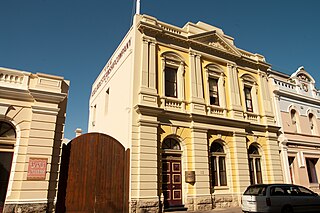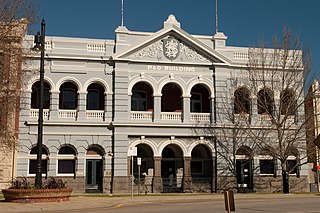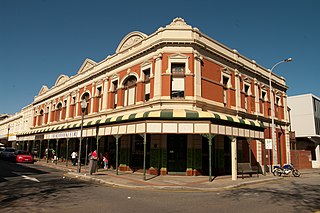
The University of Notre Dame Australia is a public Roman Catholic university with campuses in Perth in Western Australia and Sydney in New South Wales. It also has a regional campus in Broome in the Kimberley region. It was established by an act of the Parliament of Western Australia in 1989. Its Perth campus is notable for its restored late Georgian, Victorian and Edwardian-style architecture, most of which is ubiquitous in Fremantle's West End heritage area as a university town. Its two inner Sydney campuses are also located in historical landmarks, on Broadway and Darlinghurst, and it also has a number of clinical schools in regional New South Wales and Victoria.

The Adelaide Steamship House is located at 10-12 Mouat Street, Fremantle. Built in 1900, the building was designed by Fremantle-based architectural firm Charles Oldham and Herbert Eales and was constructed by C. Coghill. The building takes its name from the original owners of the building, the Adelaide Steamship Company, who provided sea passenger and freight services around Australia.

The Adelec Buildings located at 28–36 High Street, on the corner of Henry Street in Fremantle, Western Australia. The heritage listed buildings were constructed in 1906 during the gold boom period by the trustees of Captain Edward Henry Fothergills estate.

Mouat Street is a 300-metre-long (980 ft) street in Fremantle, Western Australia. Historically, the name was often spelled as Mouatt Street.

The former P&O Building, also known as the Australian Union Steamship Navigation Company building, is a heritage-listed building in Phillimore Street in the west end of Fremantle, Western Australia.

Cliff Street is a street in Fremantle, Western Australia. It is the furthest west cross street on High Street, running parallel to Mouat Street.

Phillimore Street is a street in Fremantle, Western Australia; it runs between Queen Street, outside the Fremantle railway station and Cliff Street.

Fremantle West End Heritage area is a designated heritage precinct in Fremantle, Western Australia.

Pakenham Street is a street in Fremantle, Western Australia, in the Fremantle West End Heritage area. It runs between Phillimore Street and Collie Street, the main cross intersection being with High Street.

The Oceanic Hotel is a heritage listed building located on Collie Street on the corner of Pakenham Street in Fremantle, Western Australia.

Central Chambers is a heritage listed building located at 61–63 High Street on the corner of Pakenham Street in Fremantle, Western Australia. It was one of many commercial buildings constructed in Fremantle during the gold boom period in the late nineteenth and early twentieth century.

The P&O Hotel is a heritage listed building located at 25 High Street on the corner of Mouat Street in Fremantle, Western Australia. It was one of many commercial buildings constructed in Fremantle during the gold boom period in the late nineteenth and early twentieth century.

The Frank Cadd Building also known as the Fares House, is a heritage listed building located at 33 Phillimore Street, on the corner of Henry Street in the Fremantle West End Heritage area. It was one of many commercial buildings constructed in Fremantle during the gold boom period in the late nineteenth and early twentieth century.

The former Union Stores Building is a heritage listed building located at 41–47 High Street on the corner with Henry Street in the Fremantle West End Heritage area.

The former Westpac Building, also known as the Challenge Bank Building and the Western Australian Bank Building, is a heritage listed building located at 22 High Street on the corner with Mouat Street in the Fremantle West End Heritage area. It was one of many commercial buildings constructed in Fremantle during the gold boom period in the late nineteenth and early twentieth century.

The Evan Davies Building, also known as the Literary Institute Building, is a heritage listed building located at 13 South Terrace, Fremantle, Australia, on the corner with Collie Street. It was one of many buildings constructed in Fremantle during the gold boom period in the late nineteenth and early twentieth century.

Owston's Buildings, also known as Ouston's building, is a heritage listed building located at 9–23 High Street on the corner with Mouat Street in the Fremantle West End Heritage area. It was one of many buildings constructed in Fremantle during the gold boom period in the late nineteenth and early twentieth century.

The former Tarantella Night Club building, also known as the German Consulate and Norddeutscher-Lloyd Building is a heritage building located at Mouat Street in the Fremantle West End Heritage area. The building dates from the gold rush boom period in the late nineteenth and early twentieth centuries and is of historic significance.



















